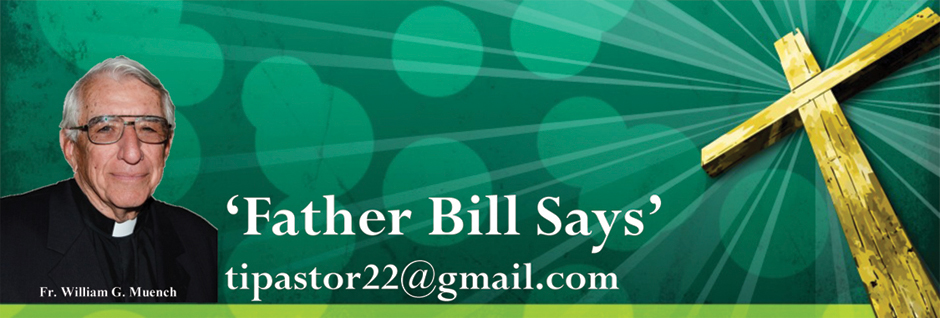Dec. 26, 2018 By Father William Muench On the first Sunday of Advent, our Catholic Church begins a new liturgical year. We start all over to follow the story of our salvation. We again celebrate the life, death and resurrection of our Lord and Savior, Jesus Christ. I am not a person who makes New Year’s resolutions, as many traditionally do. Now don’t get me wrong, I know that often I have to make changes in my life. There have been many times when I have realized personally that I need a conversion. Actually, this happens often. In fact, I recognize that as a disciple of Jesus, almost every day I must consider who I am and ask if there are any changes I should make in my life. This is time for us all. It is for this that our church has developed the Sacrament of Penance. The Sacrament of Penance is meant to be a lifetime process. This sacrament is not meant to be a series of isolated confessions. Rather this is a lifetime of opportunities to consider our own lives and recognize the need for improvement. This sacrament begins best by considering the good things that we have been part of in our own life – our accomplishments. The Sacrament of Penance must always begin in a positive way. We must then notice our failings and our sins – after all, we are human. We must recognize what is keeping us from our relationship with God; we must recognize our sins. What is it that keeps us from making our world a better place? What challenges have we refused to accept? What opportunities have we missed? How can we become a better people? In the Sacrament of Penance, we do something so that we may remember our decision for conversion. We confess to a priest. It is important that we put our failings into words. In this way we acknowledge our sins and failings. We confess so that we are ready for conversion. We want to remember this moment as we change what must be changed. The important question for us to ask ourselves is: “So, now, what am I going to do?” Nothing happens in this sacramental experience unless we make a plan. How must my path to sanctity change? The United States Catholic Catechism for Adults has an interesting review on the various names that our church assigns to this important and helpful sacrament. I would like to share this with you: “It is called the Sacrament of Conversion because it makes (us) sacramentally present Jesus’ call to conversion, the first step in returning to the Father from whom one has strayed by sin. It is called the Sacrament of Penance, since it consecrates the Christian sinner’s personal and ecclesial steps of conversion, penance, and satisfaction. It is called the Sacrament of Confession since the disclosure or confession of sins is an essential element of this Sacrament. In a profound sense, it is also a “confession” – acknowledgment and praise – of the holiness of God and of his mercy toward sinful man It is called the Sacrament of Forgiveness, since by the priest’s sacramental absolution, God grants the penitent ‘pardon and peace.’ It is called the Sacrament of Reconciliation because it imparts to the sinner the love of God who reconciles: ‘Be reconciled to God.’ He who lives by God’s merciful love is ready to respond to the Lord’s call: ‘Go, first be reconciled to your brother.’” |
||||


